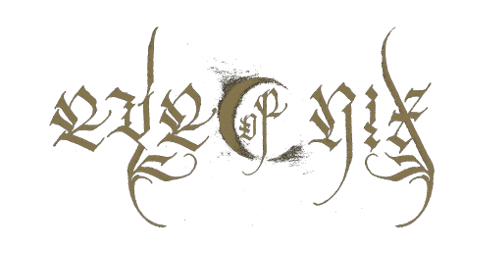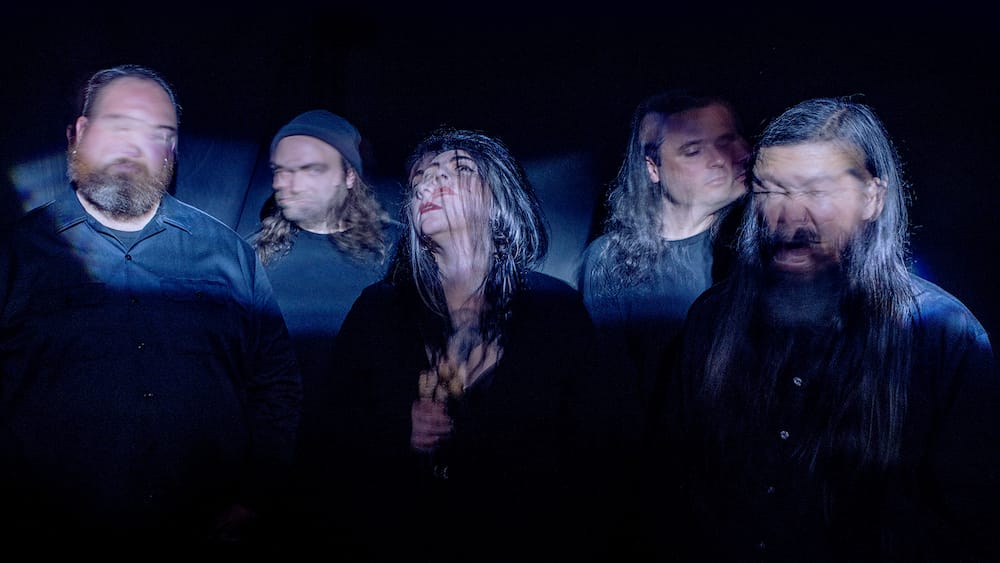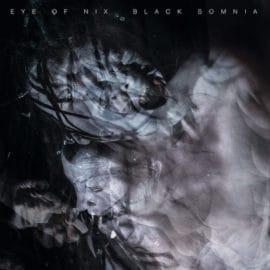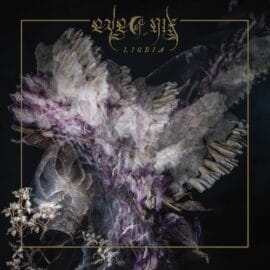On their third album „Ligeia“, EYE OF NIX have made the most of their unconventional mixture of black metal, doom metal and psychedelic rock and thereby created something truly special. We took the release of the album as an opportunity to talk to frontwoman Joy Von Spain, bassist Zach Wise and drummer Luke LaPlante about their many sources of inspiration, the sometimes completely opposite reactions to their unusual musical style and the problems of the marketing term „Female-Fronted Metal“.

Greetings! Thanks for taking the time to answer a few questions. How are you doing right now?
JVS: Holding it together, ruminating on new music ideas, working, spending some effort on mutual aid projects. Missing shows fiercely.
LL: Pretty good considering the circumstances of a pandemic. However, I’ve been taking advantage of some of this extra time to focus on practicing a wide variety of drum exercises and learning fun drum rhythms from some great drummers‘ videos online.
Currently the music scene is struggling with the situation around the corona virus – especially bands releasing new albums during this time. To what extent are you affected by these circumstances in EYE OF NIX?
LL: Like everyone else, we are unable to perform and promote our album in that way but we were lucky enough to make two music videos we are really proud of right before the pandemic hit. With our new album “Ligeia” recently released, we are able to focus on interviews, reviews and playlists to promote. We also have a new T-shirt design on sale soon and have some ideas in the works for some interesting merchandise on our new website.
JVS: The musician’s lifestyle has completely changed, and it’s missing such a huge part of how we define ourselves and interact with other people. Painful, but hopefully not permanent. Working on more music video/short film ideas to stay connected!
Vocally as well as instrumentally you do quite unconventional things with EYE OF NIX, so it’s not easy to make out your musical role models. Where do you mainly get your musical inspiration from?
ZW: Black metal represents a strong influence, but I think we all understand it differently or are interested in different aspects of it, and the confluence of those perspectives is where some of the more unorthodox elements emerge.
LL: For me on drums I grew up on a lot of American hardcore and have been influenced by albums like Neurosis’ “Word As Law,” Rorschach’s “Prodestant” and most anything by Man Is The Bastard. These styles seem to compliment EYE OF NIX in a unique and unexpected way.
JVS: I’m inspired by many amazing bands and musicians, but also just by individual moments of experience. A scene in a film where a peasant woman is mourning loudly at a grave, or the shape of a curl of smoke at a campfire. A particular melody from one piece by JS Bach I heard 20 years ago. A painting. Cats fighting. A vocal performance by a pop one-hit-wonder.
Do you have the impression that you are sometimes misunderstood as artists because of your untypical approach?
ZW: It’s best to not be concerned with the opinions of others, we aren’t working in a populist artform, and any concessions with the audience are made on our terms.
LL: Maybe? Even if a reviewer seems to have a difficult time trying to describe or understand our sound, for the most part they aren’t mean spirited. I can listen to something I may not fully understand and can still appreciate its value. I believe we’ve been described that way too and that’s ok with me. Every member for the most part listens to completely different music. So we find ourselves often in some really out there territory. I love it. I think being atypical is a benefit. It’s much better than being described as a clone.
JVS: It might make some people uncomfortable to hear a wide range of emotions in one album from a contemporary band. But most „classic“ albums have just such a range – varying tempos, volumes and textures/instrumentation. That realm is more appealing to me…

Are you yourself satisfied with everything you have released so far or would you do some things differently today?
JVS: Every album in every project is a learning experience. For me, „Ligeia“ is the closest I’m gotten to feeling totally satisfied with my vocal performance. I try to be as prepared a possible before walking into the studio, and record all vocals in a half-day. Albums now are a snapshot of where you are at the moment. It’s foolish to opine about changes you cannot make on something that was recorded 10 years ago. No one gets a year to record an album like some 70’s bands – enjoy what’s been laid down and move on.
ZW: It’s the nature of the artist to be his or her own biggest critic, so in that sense there will always be things we would have gone back and altered, but it’s best to look towards the future.
In my opinion, on your new album „Ligeia“ you make use of even more unusual style elements than before. Did you consciously aim to create an album that is as eclectic as possible?
LL: Not necessarily but we tried our best to make each song sound different. With me and Zach being the new guys and adding Joy on second guitar, there was plenty of space for everyone to share their vision and we were able to achieve something we believe is really special to us.
ZW: No, the eclecticism emerged naturally from a lack of inhibition about taking the music to different places. “Intentionally eclectic” is a pointless mission statement, we simply did what we wanted and didn’t adhere as rigidly to formal particulars as some of our peers might have.
Especially with such versatile songwriting there is certainly the danger of losing the thread. How do you make sure that your songs remain consistent?
LL: We have great communication and an understanding to keep it within our sound. Even if we experiment, we always try to keep it within our capabilities and strengths.
ZW: It’s a conscious effort from a songwriting perspective, to not simply start at one point and arrive at another but to maintain a mood or atmosphere and develop variations on themes. Some of the songs vary in tempo or technique throughout but often stick to a more rigid set of melodic ideas than you might think.
Did you sometimes even reach your technical limits when dealing with these different stylistic devices?
LL: So far we’ve been successful but we like to challenge ourselves with a song like “Pursued”. It’s rewarding to play live.
ZW: Absolutely, but if you aren’t constantly pushing yourself, what’s the point?
 Other than on your last album „Black Somnia“ you use operatic singing again on „Ligeia“. In metal music this singing technique is almost exclusively used in the symphonic genre. What originally inspired you to put operatic singing in the context of more extreme metal music?
Other than on your last album „Black Somnia“ you use operatic singing again on „Ligeia“. In metal music this singing technique is almost exclusively used in the symphonic genre. What originally inspired you to put operatic singing in the context of more extreme metal music?
JVS: When we are writing a new song, I just hear a vocal part in my head (sometimes based on overtones from the guitars & cymbals interacting). Or I just start vocalizing and it writes itself. Could be an operatic line, something brutal, or gentle, usually guided by my subconscious.
Why did you decide to temporarily take a step back from this style of singing and to now include it in your music once again?
JVS: Our first two albums’ songs overlapped quite a bit as far as what we were playing live. It didn‘t feel like „taking a step back“ from operatic vocals during those couple years as we would still play „Elysium Elusive“ sometimes. „Toll On“ has a quiet section in the middle of the song that calls upon a baroque melodic style that doesn’t feel outside opera to me. It’s just a softer part of my range and doesn’t have the forceful air of „Elysium“, or „Tempest“ from the new album. In addition, I use operatic technique in my other project To End It All from time to time since 2017.
The songs’ lyrics which are about subjects like obsessions and illusions seem to be quite cryptic. Could give us a bit more detailed insight into what the songs are about and what your personal connection to those subjects is? And, according to your label „Ligeia“ is named after a mythological figure, a siren. How does this title relate to the seemingly rather personal lyrics?
JVS: Universally, in times of pain or desperation, humans are psychologically susceptible to shiny things, slick words from opportunists, addictive substances, dangerous pursuits. I’m not passing judgement on any of these things, just acknowledging their existence. The siren myth tells how we can be swept up in a storm and dashed against the rocks, lured in by something that seems wonderful in the moment. We can see the tale everywhere.
 The album sounds mostly dark and even downright disturbing. Would you still say that there is some beauty and light to be found in it?
The album sounds mostly dark and even downright disturbing. Would you still say that there is some beauty and light to be found in it?
JVS: It’s interesting to hear you say this, because for some listeners it’s on the cusp of too much light, too much beauty, too much allusion to the human side. It’s fascinating how much variation there is in how the album is being heard.
LL: We attempted to portray the feelings of the beautifully grotesque by exhibiting a flurry of expressions. To me the title song “Ligeia” is the perfect example of shining a light through the dark and blinding fog.
ZW: From my perspective, it’s the most melodic record I’ve ever done. It’s certainly melancholic at times, but even the ugliest parts are in service of a humanity, there’s a beating heart to it all. “Pursued” – one of the most dissonant songs on the record – is a tribute to a now-fallen comrade. There’s a humanity to it.
The sound of your albums has always been quite raw. Do you think a more polished production would go against your artistic vision?
ZW: This is actually by far the most polished record we’ve done. It’s extremely difficult wrangling the complex and spacious sound of this band into a stereo recording.
JVS: On „Ligeia“, we were more interested in creating atmosphere than hearing every thrum of the pick. We chose guitar layering and tone to create something to mimic the string section of an orchestra, rather than have ‚guitar solos‘. Vocally, I do not want to hear myself with an overly compressed, clean radio-ready pop sound.
LL: I think we will always be looking for the fullest sound possible. I also think we know exactly what we want to hear out of our respective instruments. With the right engineer/producer, we could potentially create something very powerful with an enhanced production value.
For the production of your current album you have teamed up with Michael Zech. Why did you want him in particular to be the producer and how was the experience of working with him?
LL: Absolutely fantastic. Michael has a great work ethic, ear and ability to push us towards greater creativity.
ZW: I’ve been a fan of Michael’s work with Secrets Of The Moon, The Ruins Of Beverast and others for a long time and forces aligned at the right time that made him the most logical choice. It was absolutely the right call.

You also worked with Joseph Seuferling for the music video for „Concealing Waters“. Why did you want this song in particular to be visualized?
JVS: We chose this song because it encapsulates style elements from the rest of the album into one piece. It’s one of the more straight-forward song forms on the record, and we felt it should be the first single, and have a beautiful video to accompany.
It seems like a lot of effort has been put into the making of this video. Do you think that music videos are too often treated as a mere pragmatic means of promotion instead of a way of artistic expression?
JVS: They should not be just for promotion of a product in my opinion. I would love for a marriage of filmmaking and music on each music video. We planned „Pursued“ to be a short film, but when the pandemic struck we have to change plans just a part way through shooting. It became more of a ‚performance video‘.
What have you got planned next for EYE OF NIX?
ZW: I’d like to continue work on the follow-up record. This was just a warm-up for what’s to come.
LL: To continue working on writing the songs we were working on before the pandemic. We learned a lot as a band with a new rhythm section by recording “Ligeia”. We have come to understand our strengths and are really excited to expand on them when it becomes safe for us to practice again. Then hopefully we can hit the road again soon and especially play in Europe.
JVS: Likely our next album will be a pandemic-bound project because the US is handling things so terribly. We’ve decided the follow-up can be a studio album with unlimited options. We’ll see how that comes together! And yes, the goal is to tour as soon as it’s possible.
Finally, I would like to go through a short brainstorming with you. What do you think of the following terms?
Spirituality:
LL: Atheist
ZW: Everything is true, and nothing is real.
JVS: Unknowable
Avant-garde:
LL: Often misused. Especially in extreme music.
JVS: Could encompass any modern techniques like pastiche, fusion, aleatoric music, minimalism, maximalism, anti-music
ZW: As an artist, if you aren’t constantly exploring and challenging yourself and your preconceived ideas, you’re wasting your time. Innovation shouldn’t be ghettoized to a genre, it should be the standard.
„Female-fronted metal“:
JVS: A term created by men for men.
ZW: Recorded music has no gender, it’s a piece of dead sound coming from a speaker. People only bring this up as a marketing strategy. Women are capable of producing different vocal sounds from men – that’s the only contextual reason you should mention the gender of a musician.
LL: An ally to women in music but think it is disingenuous to focus on a band as “female fronted.”
Black Lives Matter:
LL: 100%
JVS: The era of white patriarchal dominance must end now.
ZW: Police brutality and racial inequality are very dire issues in the US.
Concept album:
LL: Maybe not for us but I’m a huge prog rock nerd so there’s no way out of that.
ZW: Every album is a concept album, some of them just don’t know it.
JVS: I’d try my hand at a real one some day. We dipped our toes in with „Ligeia“.
DIY:
ZW: I think some Americans romanticize DIY to the point where they distrust everyone who isn’t totally in line with their vision of self-dependency and fail to use the tools that are right in front of them, it becomes some kind of strange status thing. What’s more important is to learn as much as you can and use that information to your own advantage, there’s no reason you can’t get what you want out of the music industry if you’re intentional about what you do.
LL: DIY for life!
JVS: I’m interested in mutual partnerships that maintain my artistic vision. If that’s with other individuals or with a label, it’s all good…
Thanks again for this interview. If there is anything else you would like to share with the readers, feel free to do so at this point:
JVS: Just that we are thrilled to become connected with listeners in Germany and the rest of Europe. We hope to play for you as soon as possible. Thank you!
Dieses Interview wurde per E-Mail geführt.
Zur besseren Lesbarkeit wurden Smilies ersetzt.
